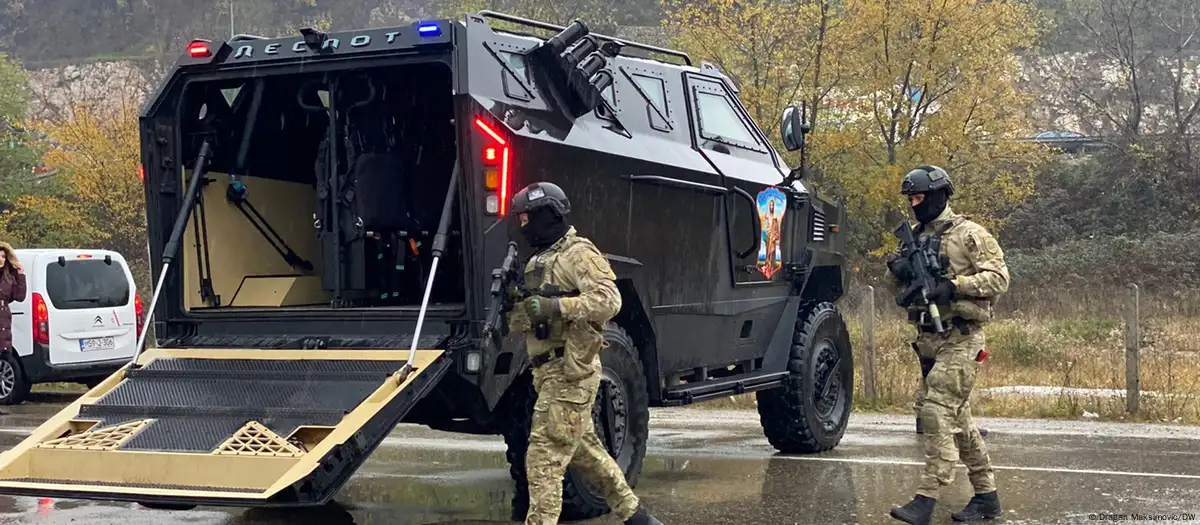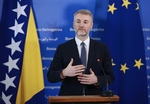Confusion in BiH's intelligence sector: Are there Russian paramilitary camps in the country or not?

Moldovan intelligence agencies have released reports suggesting the existence of training camps in Bosnia and Herzegovina and Serbia, allegedly used to train individuals for stirring unrest in Moldova. The reports claim that over 300 young people from Moldova were trained in camps in the Russian Federation, as well as in Serbia and BiH, with the goal of causing widespread destabilization and unrest ahead of the October 20 presidential elections and constitutional referendum on EU membership, DW reports.
“They also received specialized instructions on using drones equipped with explosives and pipe bombs, from September to mid-October, from foreign individuals associated with private military groups such as Wagner and Ferma,” said Alexandru Musteata, head of Moldova’s Intelligence and Security Service (SIS), as reported by Moldovan media.
“Some individuals, some groups”
Moldova’s Intelligence and Security Service (SIS), in cooperation with Moldovan police (IGP) and the Prosecutor’s Office for Combating Organized Crime (PCCOCS), identified 13 foreigners serving as coordinators, trainers, and instructors, according to a police statement. SIS also identified another 11 foreigners who served as instructors in training camps in BiH and Serbia.
Several days later, Bosnia’s Commission for Oversight of the Intelligence-Security Agency (OSA) received information indicating that groups had been in Bosnia over the past two months, with unofficial reports suggesting that the camps were located in BiH’s Republika Srpska (RS) entity.
“There were some individuals, foreign nationals, in Bosnia who could be identified as people involved in organizing certain groups that might, at some point, act against public gatherings,” said Ilija Cvitanović, a member of the joint commission overseeing OSA, denying the existence of camps. “We didn’t receive specific details since it concerns operational matters, but there are no camps. At one point, suspicious nationals from the East were present in Bosnia, but there were no camps. The reasons for their stay in Bosnia are under investigation.”
Moldovan police released hidden camera footage of alleged training sessions in Russia, Serbia, and Bosnia, showing young people in a classroom setting, practicing “protest drills” and chanting slogans like “our language is Russian,” “no dual citizenship,” and “we don’t want to join Europe”.
U.S. condemnation, Banja Luka's response
Officials from Banja Luka responded to reports about the existence of camps, categorically denying the news reports.
“The Ministry of Interior had previously, and again now with the appearance of these claims, taken measures within its jurisdiction and investigated such claims. We contacted all relevant agencies, including Moldova’s services. No intelligence agency, locally or regionally, has this information,” stated RS Interior Minister Sinisa Karan.
Bosnian Security Minister Nenad Nesic also refuted the Moldovan reports, claiming that “there is no relevant evidence or material indicating that anything like this took place in Bosnia.”
The U.S. Embassy in Bosnia responded to Moldova’s report, emphasising that the existence of these camps should be thoroughly investigated and those responsible held accountable. The embassy used the opportunity to remind authorities in RS that these reports “raise serious questions about the RS leadership's commitment to reforms and their European orientation.”
A strong response came from RS leader Milorad Dodik, who, speaking from the BRICS summit in Kazan, stated, “The Americans know very well that there are no camps in Republika Srpska.”
On platform X, Dodik announced that he would convene a meeting with officials and relevant agencies today (October 26) to prove this and would also inform Russia about the lies being spread against Republika Srpska.
A day before the meeting, Bosnia’s Prosecutor’s Office reported that no investigation would proceed following earlier claims by BiH Defense Minister Zukan Helez about camps in RS where Russians were allegedly conducting terrorist training.
The Prosecutor’s Office added that there is no evidence of training people to commit terrorist acts in Moldova and that relevant security institutions should address the matter.
Questionable credentials
Security expert Safet Music commented that such information has been circulating in the public sphere for some time, and it is telling that no one seems interested in pursuing it further. Additionally, there is no confirmed public information about such cases.
“All this information adds more confusion to the intelligence-security sector rather than providing clarity. A much more professional approach and seriousness are needed in all these cases,” Music said, adding that it’s difficult to comment on who is behind all this or what the motives are since no official agencies have provided any information.
The confusion within the intelligence-security sector is the result of years of poor performance and unprofessionalism, largely influenced by political interference. Analyst Djuro Kozar notes that Bosnia is not immune to the world’s “second-oldest profession,” espionage, which has attracted individuals from Arab countries, Russia, the U.S., the U.K., France, as well as neighbouring Serbia and Croatia.
“Why intelligence-security structures lack information about this, as well as potential camps and activities of various groups, is rooted in the past. OSA doesn’t have counterintelligence authority. When it was established, foreign advisors deemed it unnecessary,” Kozar said, suggesting that this agency could otherwise coordinate and have data on potential threats.
Kozar believes the news about alleged camps should not be dismissed lightly.
Internal "enemies"
In addition to the camps and the infamous drones that recently flew over BiH Armed Forces facilities—a matter about which the public remains uninformed—Foreign Minister Elmedin Konakovic reported another potential security issue. He mentioned individuals within BiH institutions who allegedly work under the direction of Serbia’s Security Intelligence Agency (BIA).
“We are very seriously analysing who this infiltrated element is, the spy posing as a protector of Bosnian interests while simultaneously destabilising both the Constitutional Court and the OHR in concert with Dodik. This person presents as part of the pro-Bosnian bloc but works in Serbia’s interests to destabilise two key institutions,” Konakovic said.
Bosnia’s politicized security structure opens doors to broader influences, which no one seems genuinely interested in curbing. Though it is a long process, Bosnia’s security system needs a complete separation from political influence, DW reports.
“We’re still a country that values loyalty over professionalism. In other countries, politicians may support certain individuals to lead security services, but they prioritise professional qualifications. Unfortunately, we appoint people who are not prepared to cooperate within the state, let alone with other countries,” Music said, stressing that Bosnia is fortunate to be in Europe, which is willing to assist, but that domestic politics seem intent on ensuring nothing functions properly.
Kakvo je tvoje mišljenje o ovome?
Učestvuj u diskusiji ili pročitaj komentare





 Srbija
Srbija
 Hrvatska
Hrvatska
 Slovenija
Slovenija



























































